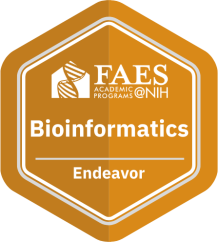GlyGen and Foundation for Advanced Education in the Sciences (FAES) 2024 Workshop
BIOF-GLYC 031 - Unraveling the Interplay of Genes, Proteins, and Glycans through Bioinformatics
Course Description Academic Programs at the NIH (FAES) and the GlyGen team is pleased to offer a one day, in-person, workshop at the National Institutes of Health, Bethesda campus on June 10, 2024.
Overview
The workshop will introduce participants to “GlycoBioInformatics Tools” and provide hands on exercises on GlyGen: Computational and Informatics Resources for Glycoscience.
The workshop is comprised of two sessions. In the morning, the instructors will share an overview of glycobiology and glycomics and will explore common bioinformatics tools that are used to analyze genes, proteins and glycans. In the afternoon, you will be guided by the instructors on how to use GlyGen and explore a variety of functions through hands-on exercises.
This workshop will be team taught by the GlyGen Team.
Registration
To register, click on "Add to Cart"
Total cost includes $75 non-refundable technology fee per course when applicable.
| Course Name | Section Title | Schedule and Location | Total Cost |
|---|---|---|---|
| BIOF-GLYC 031 - Student, Trainee, Fellow, .Gov, .Mil | Unraveling the Interplay of Genes, Proteins, and Glycans through Bioinformatics | Type: Lab
Days: M Time: 8:30AM to 5:30PM ET Dates: Jun 10, 2024 Location: NIH Main Campus |
$199.00 |
| BIOF-GLYC 031 - Academic Pro | Unraveling the Interplay of Genes, Proteins, and Glycans through Bioinformatics | Type: Lab
Days: M Time: 8:30AM to 5:30PM ET Dates: Jun 10, 2024 Location: NIH Main Campus |
$500.00 |
| BIOF-GLYC 031 - General | Unraveling the Interplay of Genes, Proteins, and Glycans through Bioinformatics | Type: Lab
Days: M Time: 8:30AM to 5:30PM ET Dates: Jun 10, 2024 Location: NIH Main Campus |
$750.00 |
Agenda
Morning Session (Lecture)
- A bioinformatics approach to studying genes, proteins and glycans.
- Glycobiology - What are glycans?
- Importance of glycans in health and disease
- Common bioinformatic tools to analyze genes, proteins and glycans
- How to find them
- Overview of glycomics tools (predication, mass spec, cartoon, etc.)
- Structure and use of common knowledgebases and tools that can be used to explore protein and glycan function
- Where to find them
- Overview about Glycomics and GlycoProteomics databases/knowledge bases
- Teaser: What is GlyGen
Lunch break
Afternoon Session (Hands-On)
- GlyGen: Find glycans and proteins
- Search glycan →List page → Details page
- Search protein → List page → Details page
- GlyGen: Understanding subsumption
- GlyGen: Glycosylation
- Search protein by glycosylation
- Filtering on list pages
- Browsing glycosylation
- GlyGen: Exploring sites
- Sequence viewer
- Protvista
- Site search
- GlyGen: Super search and other searches
- Sandbox: Enzymes and pathways
- GlyGen: Tools
- Mapper
- Blast
- Sequence Lookup
- Motif Wiki
- Open Question Session
Microcredential(s)
This workshop applies toward the Bioinformatics Endeavor digital badge.

Prerequisites
Software/Equipment Requirements
It is preferred that you bring your own laptop; however, FAES can lend a laptop if needed. Please contact registrar@faes.org prior to the workshop to inquire.
Additional Information
Credit
Although no grades are given for courses, each participant will receive Continuing Education Units (CEUs) based on the number of contact hours. One CEU is equal to ten contact hours. Upon completion of the course each participant will receive a certificate, showing completion of the workshop and 0.7 CEUs.
Self-Funded Participant
A limited number of scholarships are available. Apply here.
Refund
Follow the link to review FAES Tuition Refund Policy.
Funding Justification Guide
Some labs and institutes may have specific funds set aside for trainees to continue their education and professional development. FAES has created a guide intended to help trainees request funds that may be available and, if they are available, request use of the training funds for continued professional development. More details.